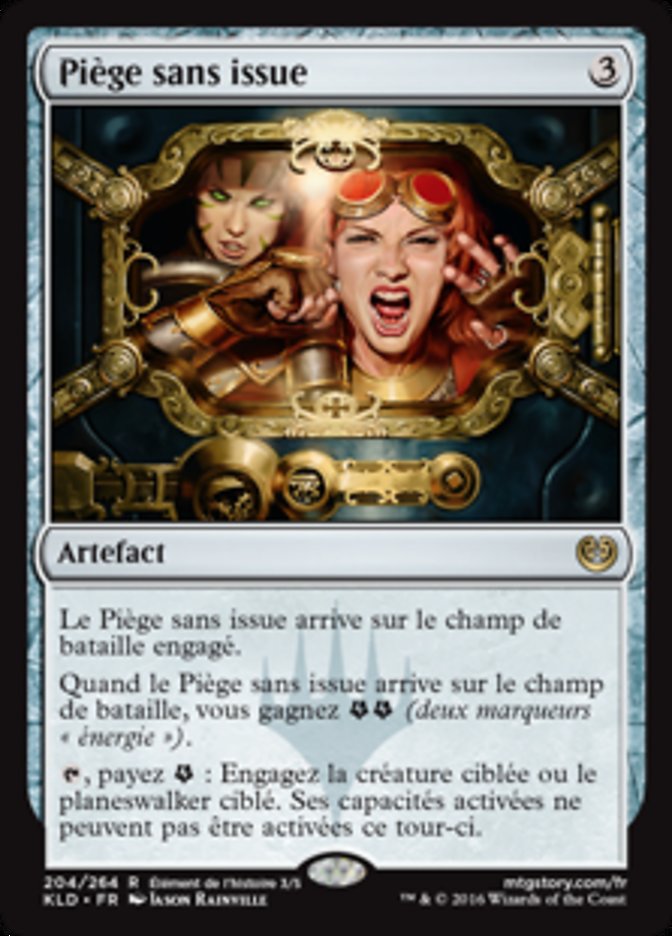
Piège sans issue {3}
Artefact
Le Piège sans issue arrive sur le champ de bataille engagé.
Quand le Piège sans issue arrive sur le champ de bataille, vous gagnez {E}{E} (deux marqueurs « énergie »).
{T}, payez {E} : Engagez la créature ciblée ou le planeswalker ciblé. Ses capacités activées ne peuvent pas être activées ce tour-ci.
Watermark: Planeswalker
DailyMTG Story Spotlight
Illustrated by Jason Rainville
- Standard
- Not Legal
- Alchemy
- Not Legal
- Pioneer
- Legal
- Explorer
- Not Legal
- Modern
- Legal
- Historic
- Not Legal
- Legacy
- Legal
- Brawl
- Not Legal
- Vintage
- Legal
- Timeless
- Not Legal
- Commander
- Legal
- Pauper
- Not Legal
- Oathbreaker
- Legal
- Penny
- Legal
Toolbox
Buy This Card
Notes and Rules Information for Piège sans issue:
- Only the English version of a Magic card receives Oracle updates and errata. View this card in English. (Scryfall note)
- Activated abilities contain a colon. They're generally written "[Cost]: [Effect]." Some keywords are activated abilities and will have colons in their reminder text. (2016-09-20)
- Once a player has announced an ability, Deadlock Trap can't be used to undo it. The last ability must be activated before that player activates that ability. (2016-09-20)
- Players may respond to Deadlock Trap's last ability by activating an ability of the target permanent if that ability's timing permissions allow it. (2016-09-20)
- After a planeswalker enters the battlefield, the active player receives priority and may activate an ability of that planeswalker before any player can activate Deadlock Trap's last ability. (2016-09-20)
- A tapped planeswalker can be attacked or dealt damage as normal. (2016-09-20)
- If the tapped creature somehow becomes untapped, it can attack and block as normal, but its abilities still can't be activated this turn. (2016-09-20)
- There are many important moments in the story, but the most crucial—called "story spotlights"—are shown on cards. These cards have the Planeswalker symbol in their text box; this symbol has no effect on gameplay. You can read more about these events in the official Magic fiction at www.mtgstory.com. (2018-01-19)
- {E} is the energy symbol. It represents one energy counter. (2024-06-07)
- Energy counters are a kind of counter that a player may have. They're not associated with any specific permanents. (2024-06-07)
- Keep track of how many energy counters each player has. Potential ways to track this include writing theme down on paper or using dice, but any method that is clear and mutually agreeable is fine. (At higher levels of tournament play, dice may not be allowed for tracking counters that players have.) (2024-06-07)
- If an effect says you get one or more {E}, you get that many energy counters. To pay one or more {E}, you lose that many energy counters. You can't pay more energy counters than you have. Any effects that interact with counters a player gets, has, or loses can interact with energy counters. (2024-06-07)
- Energy counters aren't mana. They don't go away as steps, phases, and turns end, and effects that add mana "of any type" can't give you energy counters. (2024-06-07)
- Some triggered abilities state that you "may pay" a certain amount of {E}. You can't pay that amount multiple times to multiply the effect. You simply choose whether or not to pay that amount of {E} as the ability resolves. (2024-06-07)
- Some triggered abilities that state that you "may pay" a certain amount of {E} describe an effect that happens "If you do." In that case, no player may take actions to try to stop the ability's effect after you make your choice. If the payment is followed by the phrase "When you do," then you'll choose any targets for that reflexive triggered ability and put it on the stack before players can take actions. (2024-06-07)
- If a spell or ability with one or more targets states that you "may pay" some amount of {E}, and each permanent that it targets has become an illegal target, the spell or ability won't resolve. You can't pay any {E} even if you want to. (2024-06-07)
- Some spells and abilities that give you {E} may require targets. If each target chosen is an illegal target as that spell or ability tries to resolve, it won't resolve. You won't get any {E}. (2024-06-07)